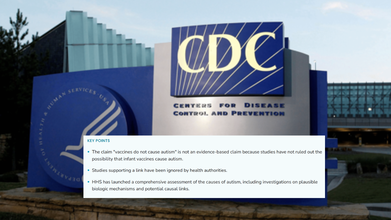- Health Conditions A-Z
- Health & Wellness
- Nutrition
- Fitness
- Health News
- Ayurveda
- Videos
- Medicine A-Z
- Parenting
New Report May Completely Change US Guidelines On Alcohol Consumption

Alcohol Consumption and Guidelines (Credit-Canva)
There have been multiple studies that show how alcohol, or wine in some ways can be useful to your body, even healthy in some ways, but one thing that usually goes unnoticed is the ‘more than’ and ‘less than’ aspect of it.
According to the US guidelines on alcohol consumption, one glass for women and two for men is ok. These guidelines have been based on studies that show the effects of alcohol on the human body with multiple researchers working on them. But in the new research done by National Academies of Sciences, Engineering and Medicine report, commissioned by a government shows that even drinking a small amount of alcohol every day can be bad for your health. The reason why this study is so significant, based on this and other studies, the guidelines on alcohol can completely change! The U.S. general surgeon has also suggested putting labels on the bottles.
Are The Previous Studies On Alcohol Not Relevant Anymore?
You must remember that whether you drink daily, or occasionally, are some things that need to be considered when you are claiming that drinking is ok or not. Other things that might change the way alcohol affects you is how much you have it, are you a daily drinker but drink a glass or half or are you an occasional drinker who drinks limitlessly until they blackout? No matter what kind of drinker you are, you have to keep two things in mind. One, alcohol will affect your system as soon as it enters your body, because it is a strong inflammatory component. Two, when studies say that ‘may cause less effect’ or something similar, you must always take into consideration that it is often comparing extremes like drinking small amounts daily is better than getting blackout drunk occasionally or vice versa.
Daily Alcohol Consumption Shows Higher Health Risk
The report looked at lots of studies and found that drinking daily can increase your chances of getting several serious illnesses. This news is important because it goes against the idea that a little bit of alcohol is good for you. It's crucial to understand these risks so people can make informed choices about their health. The report links drinking alcohol every day to a number of health problems. One major concern is liver cirrhosis, which is severe damage to the liver. Daily drinking also increases the risk of getting different types of cancer, including cancer of the colon, breast, liver, mouth, and throat. Another risk is an increased chance of getting injured, possibly due to accidents or impaired judgment. While some studies suggested a lower risk of a certain type of stroke (ischemic stroke) with moderate drinking, this potential benefit disappears if someone occasionally drinks a lot at once (binge drinking).
Challenging the Idea of "Healthy" Drinking
Many people have heard that drinking a small amount of alcohol, like a glass of wine with dinner, can be good for their health. However, this new report challenges that idea. Experts are now saying that there isn't really a safe amount of alcohol that is completely without risk. Even small amounts can have negative effects. The report says there's no level of drinking that will definitely make you healthier or live longer. This is a big change from some previous thinking about alcohol and health.
Role of Alcohol in Lives Of Young Adults
The report also looked at how alcohol affects teenagers and young adults between the ages of 15 and 20. They found that the more alcohol young people drink, the higher their risk of dying. This is often due to accidents, especially car crashes, and other kinds of injuries. Alcohol-related incidents are a leading cause of death in this age group. This part of the report emphasizes the importance of preventing underage drinking and educating young people about the dangers of alcohol.
NHS Warns About Pancreatic Cancer Symptoms That Are Easy To Miss

Credits: Canva
The NHS has issued an urgent reminder about symptoms that many might shrug off as “normal,” urging anyone noticing them to get medical advice promptly. In a post on X, the health service highlighted the importance of checking in with a doctor if something feels off.
NHS warned: "Symptoms of pancreatic cancer are common and can be caused by many things. It’s important to be seen by a GP if anything doesn’t feel normal. If your symptoms are due to cancer, catching it early may make treatment easier."
What Is Pancreatic Cancer?
Pancreatic cancer occurs when abnormal cells grow uncontrollably in the pancreas, a gland located behind the stomach. These cells can form a tumor. Most cases start in the exocrine cells that produce digestive enzymes; this type is often referred to as pancreatic ductal adenocarcinoma, according to the National Cancer Institute.
NHS experts also explained that pancreatic cancer can develop anywhere in this crucial organ, which sits in the upper abdomen and helps with digestion while producing important hormones like insulin. The severity of pancreatic cancer depends on its location, size, whether it has spread, and the person’s overall health.
Signs and Symptoms of Pancreatic Cancer
Pancreatic cancer can be difficult to detect, and many people show no symptoms at first. Some signs may include:
- Yellowing of the eyes or skin (jaundice), often accompanied by itchy skin, dark urine, and pale stools
- Loss of appetite or unexplained weight loss
- Feeling constantly tired or low on energy
- Fever, or feeling hot and shivery
- Nausea or vomiting
- Diarrhoea, constipation, or other changes in bowel habits
- Pain in the upper abdomen or back, sometimes worse when eating or lying down and eased by leaning forward
- Indigestion, bloating, or discomfort
Common Signs Don’t Always Mean Cancer
It’s worth noting that these symptoms are fairly common and may be caused by other health issues. That’s why early medical assessment is so important.
The NHS emphasized: "Having these symptoms doesn’t automatically mean you have pancreatic cancer, but it’s crucial to see a GP. If cancer is the cause, early detection could make treatment more effective."
Types Of Pancreatic Cancer
Pancreatic tumors are generally classified into two main types, as per Cleveland Clinic:
- Exocrine tumors: These make up more than 90% of all pancreatic tumors. The most common form is adenocarcinoma, which starts in the cells that line the pancreas and other organs.
- Neuroendocrine tumors: Representing less than 10% of pancreatic tumors, these are also called islet cell carcinomas and develop from hormone-producing cells in the pancreas.
Risk Factors of Pancreatic Cancer
Certain factors can increase the risk of developing pancreatic cancer, including:
- Smoking
- Type 2 diabetes
- Chronic inflammation of the pancreas (pancreatitis)
- Family history of genetic changes that raise cancer risk, such as BRCA2 mutations, Lynch syndrome, or FAMMM syndrome
- Family history of pancreatic cancer
- Obesity Older age; most patients are over 65
Orforglipron: All You Need To Know About the GLP-1 Pill That Could Replace Weight-Loss Injections

Credits: Canva
A daily pill could soon serve as an alternative to Wegovy and Ozempic injections, after a recent trial revealed it helped people with obesity and type 2 diabetes lose significant weight and improve blood sugar control. This new once-a-day tablet, which could be cheaper than injectable treatments, helped participants shed up to 10 per cent of their body weight, according to the study.
Researchers note that orforglipron may make these medications more accessible to people who currently cannot afford costly injections. Orforglipron is a GLP-1 agonist, a type of drug that lowers blood sugar, slows digestion, and can reduce appetite. At present, GLP-1 medications are injected by around 2.5 million people in the UK and can cost up to £206 per dose.
What Is Orforglipron?
Orforglipron (LY3502970) is a small-molecule, non-peptide GLP-1 receptor agonist (GLP-1RA) designed for oral use. Unlike popular GLP-1RAs such as semaglutide, orforglipron does not require injections or fasting to achieve absorption and can be taken without restrictions on water or food, according to Phase 1 pharmacokinetic studies. “Its weight loss and diabetes benefits may not match tirzepatide, but the convenience of a pill could appeal to those who prefer not to inject,” explained Alex Miras, professor of endocrinology at Ulster University, to the Independent.
Is Orforglipron Safe To Take?
Orforglipron is being studied for safety and effectiveness in treating obesity and type 2 diabetes through ongoing clinical trials by Lilly. Early results are promising, and further data is expected in the first quarter of 2026. It has not yet been approved for use, as per the official page Eli Lilly and Company.
Orforglipron Price
Eli Lilly has not yet revealed the final price of Orforglipron, as it is still undergoing clinical trials and has not been approved for public use. Analysts anticipate that its cost could be comparable to existing drugs like Zepbound, likely ranging from $400 to $1,000 per month, depending on insurance coverage and market factors.
Lancet Study On Orforglipron
In the United States, patients are expected to start taking the pill in early 2026, with a global rollout to follow. A study done by Lancet included 1,444 participants with obesity across 10 countries, given varying doses of the pill or a placebo for comparison. All participants received guidance on healthy eating and exercise and were monitored over 16 months.
Participants taking the highest dose, 36mg, lost an average of 9.6 per cent of their body weight. Those on 12mg lost 7 per cent, and those on the lowest dose, 6mg, lost 5.1 per cent. Placebo participants lost 2.5 per cent.
The pill not only promoted weight loss but also helped reduce blood sugar levels. The most common side effects were mild to moderate gastrointestinal issues, as per The Indepedent.
Researchers highlighted that the pill could be cheaper, does not require cold storage, and can be taken without specific instructions around food or fasting, making it more accessible to a broader population.
“Having additional safe and effective weight loss options is a significant step forward,” said Naveed Sattar, professor of cardiometabolic medicine at Glasgow University, to the Independent.
“A new oral weight-loss tablet that can be taken alongside other medications without fasting could provide a convenient solution for people with mild to moderate obesity who want to prevent further weight gain,” he added.
“Given its safety profile and predicted lower cost, orforglipron could allow many more individuals, with or without diabetes, to access treatment for obesity worldwide,” said senior study author Dr. Deborah Horn, medical director of the Centre for Obesity Medicine at UTHealth Houston.
“My hope is that orforglipron will become the ‘metformin’ of obesity—a low-cost, widely accessible, low-risk, and effective medication for obesity and related conditions.”
Scientists Are 'Freaking Out' After CDC Revives Long Debunked Claim Linking Vaccine With Autism

Credits: CDC
"We just saw it, and everyone is freaking out," told one scientists to the Washington Post on account of anonymity on seeing the Centers for Disease Control and Prevention (CDC) update its website backpedaling on the link between vaccines and autism. The said link had long been debunked, however, the Health Secretary Robert F Kennedy Jr. has echoed the thought, and has a long history of critiquing vaccines and linking it to autism.
The agency's website was updated on Thursday and under Autism and Vaccine, it notes: 'The claim "vaccines do not cause autism" is not an evidence-based claim because studies have not ruled out the possibility that infant vaccine cause autism.'
The first header reads: 'Vaccine do not cause autism', the reason the header has not been removed is all thanks to an agreement with the chair of the US Senate Health, Education, Labor, and Pension Committee that it would remain on the CDC website, as per the website.
As the Post reported, the scientists did not have any prior information about the changes to the website, neither were they consulted for it. Before the Wednesday update, the CDC website stated that studies have shown that there is "no link" between vaccines and developing autism in infants. The website previously stated that "no links" have been found between any vaccine ingredients and disorders.
Read: CDC Plans Vaccine-Autism Study Despite Scientific Consensus
The CDC's Claim: Autism and Vaccine Link
As per the CDC website, approximately 1 in 2 surveyed parents of autistic children believe vaccines played a role in their child's autism. For this, the CDC cites a 2006 survey published in the Journal of Developmental and Behavioral Pediatrics. The CDC notes that these vaccines are often those that the child receives in the first six months of life, including Diphtheria, tetanus, pertussis (DTaP), Hepatitis B (HepB), Haemophilus influenzae type B (Hib), Poliovirus, inactivated (IPV), and Pneumococcal conjugate (PCV) and one given at or after the first year of life (Measles, mumps, rubella (MMR)).
According to CDC a timeline has been provided that shows the correlation between the prevalence in autism cases and higher doses of the above mentioned vaccines. In 1986, the CDC recommended five infant vaccine doses: two oral polio (OPV) doses and three DTP injections. By 2025, the schedule expanded to include multiple doses of rotavirus, HepB, DTaP, Hib, PCV, IPV, influenza, and, at 12 months, MMR, varicella, and HepA.
Autism rates have risen since the 1980s, and while this trend coincides with an increase in recommended childhood vaccines, correlation alone does not establish causation. Autism is believed to have multiple contributing factors, and some researchers have examined possible environmental links. One study reported a statistical correlation between aluminum adjuvants and autism prevalence.
Read: Fact Check: Does Aluminum In Vaccines Cause Food Allergies As RFK Jr Claims?
While the CDC notes that correlation does not prove causation it also mentions that "it does merit further study".
What Are The Scientists Saying?
“CDC cannot currently be trusted as a scientific voice,” said Demetre Daskalakis, who formerly led the agency’s center responsible for respiratory viruses and immunizations. He resigned in August. “My question is, how language that misrepresents decades of research ended up on a CDC website,” said Debra Houry, the CDC’s former chief medical officer who also resigned in August.
However, the spokesman for the Department of Health and Human Services that oversees the CDC, Andrew Nixon, said, "We are updating the CDC’s website to reflect gold standard, evidence-based science.”
The Origin Of This Vaccine-Autism Theory
This originated from now debunked 1998 study, which was retracted after its author, Andrew Wakefield, was found guilty of professional misconduct and barred from practicing medicine in the UK. Despite decades or research no such link could be proven, however, the claim still continues in the political and public discourse.
Kennedy, who had long been anti-vaxxer, also made numerous claims, even though studies have long debunked this theory.
Many years of extensive study has shown that there is no real connection between vaccines and autism. As per a 2019 study, which was conducted over a decade in Denmark, involving half a million children, confirmed that the measles, mumps and rubella (MMR) vaccine does not increase any risk of autism. Other studies too have confirmed the same, being studied over large sample sizes. It had reinforced the medical consensus that vaccines are safe and essential for public health.
© 2024 Bennett, Coleman & Company Limited

